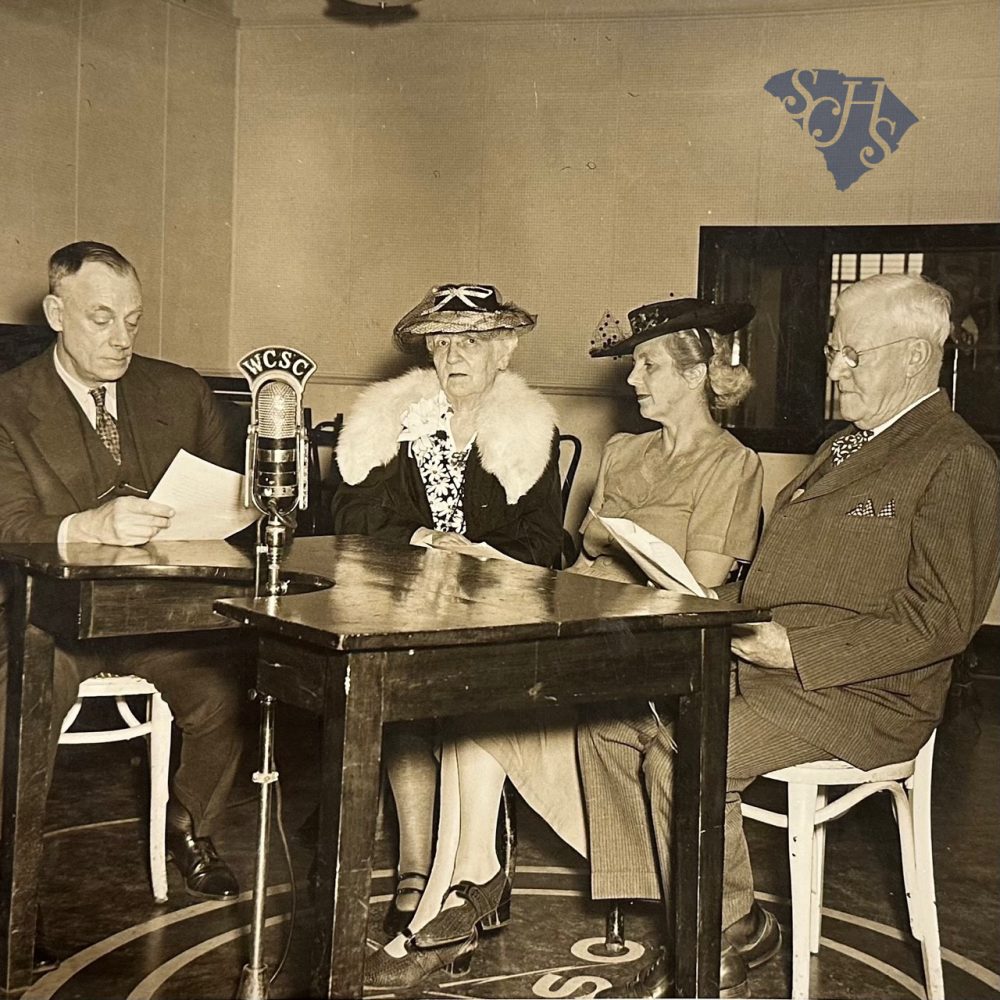
Image of Clelia Peronneau Mathewes McGowan (second from the left). From the collections of the South Carolina Historical Society.
Activist, politician, and poet Clelia Peronneau Mathewes McGowan was born on January 30, 1865. Although she is chiefly remembered for being one of the first two women elected to city government in Charleston, McGowan’s impact extended far beyond her four-year term as alderman. Her accomplishments bucked tradition, and through her activism, she aspired to benefit all South Carolinians.
Descended from slave-owning families of the South Carolina and Georgia planter class, Clelia Peronneau Mathewes was born in Columbia just two weeks before General Sherman burned the capital city. Despite her family’s financial hardship following the Civil War, Clelia’s education remained a priority to her and her parents. As a teenager, she attended Miss Kelly’s School in Charleston to become a teacher and spent one year in Sweden studying with her mother’s former governess. A well-known feminist and abolitionist, Rosalie Roos Olivecrona and her teachings expanded Clelia’s worldview and caused her question the status quo.
Returning to South Carolina, she married lawyer William Campbell McGowan, and they settled in Abbeville. After William’s death thirteen years later, Clelia relocated to Charleston with four young children. The move to Charleston marked the start of her political and social advocacy. McGowan became the president of the League of Women Voters in 1919. The next year, Governor Robert Cooper appointed her to the State Board of Education, making her the first woman to hold statewide public office alongside Jennie Lou Brown of Aiken. In this role, she became aware of the disparity in educational opportunities between Black and white students and the Board’s lack of urgency to rectify it.
Mayoral-hopeful Thomas P. Stoney encouraged McGowan to run for alderman as part of his 1923 reform ticket. She and Belizant A. Moorer were elected to represent Wards 1 and 11, respectively, and became the first two women to serve in Charleston’s city government. During her four-year term, McGowan served as chair of committees on Public Education and Public Charities and helped to establish Harmon Field, the first public playground for African American children in Charleston. After one term, McGowan opted out of a reelection bid. Rather than withdrawing from public life, the subsequent years proved to be her most active.
McGowan secured funding for a public library, which opened for all in 1931 and later became the Charleston County Public Library. As president of the Garden Club of Charleston, she created the Gateway Walk, a public path connecting Archdale Street and Philadelphia Alley. McGowan was a founding member of the Poetry Society of South Carolina, a major contributor to the city’s cultural and artistic revival of the 1920s and 1930s known as the Charleston Renaissance. She acted in plays and published a book of poems entitled Plantation Memories, and Other Poems. She chaired the Chamber of Commerce’s Health, Recreation, and Beautification Committee and sat on the board of the City Housing Authority tasked with developing low-income housing. For over twenty years, McGowan served on the Commission on Interracial Cooperation, which endeavored to improve all aspects of life for Black Americans in South Carolina and beyond. She oversaw programs for Black children at the Shaw Community Center and worked to improve conditions for Black veterans returning from World War II.
McGowan’s work to combat the racial segregation and inequality of the day earned her opponents, including some of those closest to her. At the same time, she was not immune from paternalistic attitudes. In her writings, she encouraged the return of the “mutual dependence and affection” that she believed existed between enslaved people and their enslavers. Due to her elite status and romanticization of antebellum race relations, others remained skeptical of her motives. Still, McGowan’s rose above her prescribed station and continued her activism for decades.
Clelia Peronneau Mathewes McGowan passed away in Charleston on August 13, 1956, at the age of ninety-one. Evidence of her legacy abounds throughout the city. Her portrait hangs in the City Council Chamber of Charleston’s City Hall and her papers are held in the South Carolina Historical Society’s archives. In an unpublished autobiography, McGowan writes, “adventure waits on him-or-her who dares.” McGowan dared to live unconventionally in defiance of expectations. Enticed by “the chance of some wonderful experience around the corner,” she reminds us that “it is, however, necessary to round the corners.”